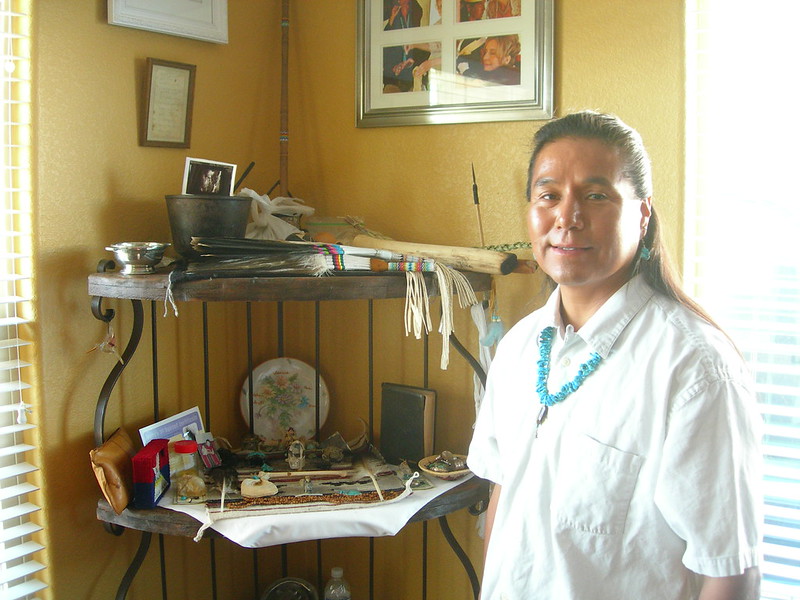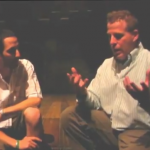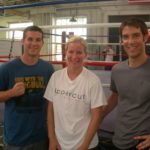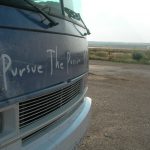Pamela Slim never believed that she could go into business on her own. Now she helps people escape from the cubicle to pursue their passions.
 After receiving her degree in international service and development, Mrs. Slim set out to save the world. At 23 she was working for a community foundation in San Francisco, yet soon found herself drawn to the corporate world. She does not reflect negatively on this time, rather acknowledging the strength of her team and importance of the mentors she found there.
After receiving her degree in international service and development, Mrs. Slim set out to save the world. At 23 she was working for a community foundation in San Francisco, yet soon found herself drawn to the corporate world. She does not reflect negatively on this time, rather acknowledging the strength of her team and importance of the mentors she found there.
At thirty, Mrs. Slim caught pneumonia, a result of complete over-exhaustion. This sickness, combined with a change of ownership within the company she was working at, led her to leave the corporate world.
She went to work as a private contractor for another large corporation; because of the nature of her contract she was forced to get her business license, a moment that made her realize she could be her own boss. Nearly twelve years later, she is “deliriously happily self-employed.”
Living in Phoenix with her husband Darryl, Mrs. Slim is currently expecting her second child, while running her company Ganas Consulting. Ganas, a Spanish word that does not easily translate, represents an internal motivation. She uses her company to help her clients through the “evolution of the human experience.” When offering advice to people hoping to pursue their passions Mrs. Slim says, “there is no secret formula for passion. Participate in a full contact way.”
Interview
I went to a little tiny college called Whirl College West. Right on the border of Marin and Sonoma Counties. We called it Which College Where, because no one knew where it was (Laughs). It was a very small liberal arts college with an international focus. So I was an international service and development major. And I had lived in Mexico my sophomore year and Columbia my senior year. My real interest and passion was community development. Looking at education as a tool for social change as a way to transform communities that were very much on the edge.
In Mexico it was in rural situations. I would live with a rural family and learning about farming subsistence practices. And also about immigration, because a lot of folks had traveled back and forth from the U.S.
In Columbia, I worked in a day care center. What they called a biranda de passion which is a neighborhood right on the edge of the city, which people just build. So I had a real passion and interest in the world. An interest in transformation and change. I was 22, so like you guys, I was filled with that “I can do it and make a difference” attitude.
I though that my trajectory was going to be more in the non profit arena. Working in community based situations, probably abroad. I thought I’d be using my languages and doing all that.
I took a little time off of school and I graduated when I was 23. My first job out of school was in a community foundation. I was fired up, ready to change the world and fight oppression.
You were working at Barclays Global Investors and then went to be self employed. What was the spark for that change?
It was interesting. I really enjoyed my job. I know people don’t believe me because Escape From Cubicle Nation is very a strong message. And there are ominous parts of the site that are very dark for a lot of people, and are very constricting and oppressive. But I found in my experience that I loved most of it when I was working there. It was my first real corporate job. I had a great team, fabulous mentors. I learned tons. Everything I know about organizational executive development, I learned there. But it was based on the people I worked with, because I had such excellent mentors.
We had an acquisition and had a whole change of management, including mine. I saw from night to day, everything totally changed. Everything about the environment and my experience. What I learned there was that it wasn’t just what I was doing that was interesting, but who I was doing it with. Our whole to approach was work that it was fun, always based on learning and critical analysis.
I was kind of in the HR organizational development area, where you can have a lot of people getting caught up in the B.S.- kind of trying to please the executives. Which is not the role you need to play in order to help them be critical of what they’re doing.
I turned thirty, and I got ammonia. I had been training seventeen classes a week of capweura, the Afro Brazilian martial art. I was teaching, I was recruiting gang members on the streets of San Francisco, I was doing performances- I just pushed myself all the way to the edge in terms of physical, emotional everything. So I decided to quit and see what came next.
I was looking for a job because I never thought I had what it took to work for myself. But I kept looking at jobs and nothing was really interesting. My revelation came the second day of my first contract with HP. My old manager actually went to HP, so I was a contractor working for her. As soon as I started working for her, I had to get my business license. All of I sudden, I said, “Oh my God! I can actually be doing this on my own and do work I love with none of the constraints of the corporate stuff. And I can be free.” I realized that the training I had been doing for the last ten years with the capweura group had an entrepreneurial element. You know, build an outreach program for at-risk kids, going from zero to two hundred fifty kids. I raised funds, did community building, all kinds of stuff.
Somehow I didn’t draw the connection that that was actually entrepreneurial. Once I did, I absolutely realized I could make it happen. I’ve never looked back. I have been deliriously happily self employed ever since. I’ve never even remotely considered going back as an employee. Never.
That was ten years ago?
Eleven years ago. August 15th.
So you just left cold turkey? Most people need some type of plan to leave a job like that.
I’m kind of a free spirit in that way. You get older and you do more planning. It’s very good. I never encourage people to do that if they’re not the type of person who makes things happen (snaps twice). But I knew that in me. And I was very employable. So maybe I was diluting myself. It was also 1996, so it was a high growth period of time. It was just when the internet dot com stuff was starting to take off. So I wasn’t really worried. Foolish, but that’s part of being young and taking risks.
How important do you think passion is in your situation with Ganas?
It is everything. The word “ganas” is a feeling. You have ganas to do something. You are motivated to do something. I know you guys have been interacting knowing what passion is. That’s part of what your whole tour is.
To me, it’s our natural fire that’s inside of each of us. It’s the natural fire that we’re born with. My husband is Navajo. It’s interesting, because what I’ve learned from his belief is that that’s what they view as the center of life. That fire.
When a young man is going through a transition from being more of a child to manhood, he has to learn how to create fire from his bare hands and wood. To carry that gentle spark all the way across a room, cultivating it and growing it. That’s part of how he learns how to care for a woman. Fickle, hard to get happy, dangerous, can burn you (laughs).
You realize that that fire is the core center of life. I’ve started my company, I’ve mainly done corporate consulting for many years, I’ve found that many people who were feeling like they weren’t connected to their passions, who weren’t happy, who weren’t able to speak their truth in a corporate environment.
The reason is, a lot of the time in corporate setting, people don’t feel like they can speak their truth. There’s all kinds of connections and connotations that we have when we think about it. If people really know how I feel, somehow I’ll be vulnerable and exposed. There’s something that’s very powerful about it, and that’s why it’s scary.
But in corporate America, if you really speak your truth, you’re probably not going to last very long. What I find with a lot of the people I work with, some ten, fifteen, twenty years in the workforce, they have been continually choking down their voice. Really what they’ve been doing is extinguishing their fire. A lot of them don’t know what it is. They really cannot tell me how they fell if I ask them how they feel or ask them what they’re interested in. They give me a totally blank look.
My work, as I view it in the big picture, is reconnecting people with that essential fire. It’s clearing out a lot of the cobwebs, beliefs of what they think they should do, fear of what it will really mean if the way they’ve lived their whole life and the way they’ve constructed it is not at all what’s going to make them happy. It can be very scary for people because it can mean major shifts in their whole life.
But that is the core. Once you tap into that, once you feel that fire, once you feel that passion, that’s where everything, your whole vision, opens up. And that’s where you can create whatever you want, like a cross country tour with a beautiful new RV (laughs).
Is it harder to pursue your passion at a later age?
I see it as a part of the human experience, and the evolution of the human experience. You can have young people who are old souls that don’t have the typical views of a nineteen year old.
Each one of us humans has our own path in terms of how connected we are to what it is that we really want to be doing.
I find some young people who are as confused and in that weird, awkward, murky area as some of the people I talk to in their forties. Some of it depends on what their life experience has been, how they were raised, what their beliefs are, what their own personal journey is.
The difference is when you get to be forty or forty-five and you realize what the price is if you don’t structure your life in a way that will lead you to live a passionate life. They feel the actual repercussions of that because they have real health problems. They’re often in crisis with their marriage. It’s a lot more anxiety producing. Your teenagers don’t talk to you. You have alcohol or substance abuse problems. All of these are manifestations of not being tied in and linked to what your passion is.
Some people feel inhibited because they haven’t lived enough. Their sense of “should” is so strong that their parents or whoever their elders are…that influence is still so close to them that they are unable to break that. You get older and you’re able to shake that because it doesn’t matter.
Is it ever too late?
It’s never too late. Never never never never. You wouldn’t believe the kinds of emails I get from people all over the world. Different ages from the sixties and seventies down to teenagers. It’s just that moment we as humans have to “wake up.”
You wake up. You make the connection between your mind and between your soul and your heart. That’s what happens. As soon as someone feels that, and they’re willing to make that connection, it doesn’t matter how old you are.
Dennis Franco
What do you tell people who are trying to escape the cubicle?
The first thing is connecting the head and the soul and the heart. Most people, when they’re desperate to escape, just look outside to the market. “Based on the skills that I have, what can I do to make money and get the hell outta here?” Sometimes, that is a viable option…temporarily. If the situation is so bad that they can’t stand it or if their health is terrible.
But really, the process is stepping back a number of steps to really look at what your life would look if it were totally healthy and in balance. You start with that picture of your life. Who would be in it? What would your home be like? Where would you live? How much money would you be making? How would you be working? All that stuff, regardless of what you would actually be doing.
When you start from that perspective, and then start doing some of that excavation of your life to figure out what you are passionate about, and what’s of interest to you, what’s your purpose in life, what are you meant to do on earth? All those things. When you have that as the background, then more of the concrete business planning skills, market analysis, all that stuff that you do comes into play. It’s a lot easier to do it that way, it’s a lot less of a crap shoot when you first define how do you really want your life to be.
If people are more shut down from what they’re passionate about, it’s a lot of excavating work. Do you remember when you were ever excited about anything? (Laughs) Then they dig deep and do homework by paying attention to what’s exciting to them.
Other people are pretty clear, but they just need the spark to do it. In that case, it’s walking them through it to see what they actually need to do to leave.
Any advice you’d like to give us?
I was thinking about that, about the four of you, what the journey is going to be like for yourselves. I think that in being young, it’s about seeing what you can pay attention to and what’ going to be useful to you. Be very tuned in to your own bodies.
I think we are all really different as humans and how we can to a place where we feel happy and passionate. It’d be nice to think we can all be millionaires if we could write the book on how you can find your passion. But I think it’s more in taking action. When you get out of the realm of just thinking about it, and you being to pay attention and really listen to the stories.
It’s important that you do this because there are a lot of other young people who are searching and are on the same path. You can help a lot of people avoid getting to where I find them sometimes at forty-five, really unhappy and in a bad situation.
And I was wondering, and this is only if you’re comfortable, but my husband was raised in a traditional medicine setting, and whenever our young folk in our family leave, he always blesses them off before they go with an eagle feather. If your comfortable, we’d love to do that for you guys. Kind of send you that way.

Daryl: You guys already have knowledge about what needs to be done. This is to send you off in that direction. I want to encourage you that way to live your life that way. Mostly, it’s for a safe journey on your passionate tour. The black road has a yellow corn and white corn. The corn that we use every day of our life. With this journey, it will make beauty ahead of you, behind you, and all surrounding you guys. From the bottom to the top. This sun will light up to you, and the root of that will grow. The plant grows in the same way. The night time is the same way. We have those dreams, whatever our dreams are. This will continue those dreams to grow strong. So I wanted to share that with you like that, and bless you off like that. Thank you for coming over and meeting my wife. We appreciate it.






